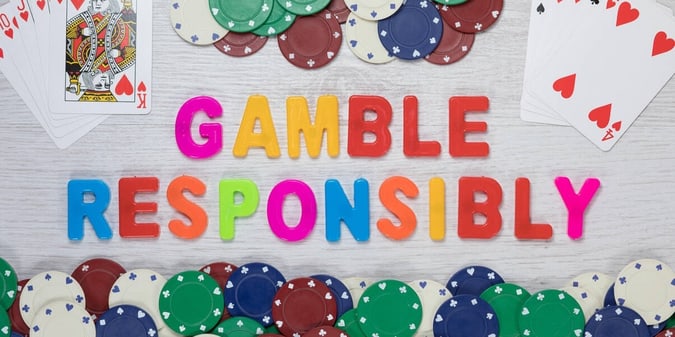Gambling Responsibly under scrutiny by academics. (Image: Mathew Kay/Alamy)
An article in The Conversation, an independent source of news analysis and informed comment written by academic experts, suggests that the ‘gambling responsibly’ mantra does nothing to prevent harm. ‘It probably makes things worse’.
The article is authored by Charles Livingstone, Associate Professor, School of Public Health and Preventive Medicine, Monash University. Professor Livingstone received funding from the Victorian Responsible Gambling Foundation, the (former) Victorian Gambling Research Panel, and the South Australian Independent Gambling Authority.
The casino industry is one of the most heavily regulated industries in the world, with regulators, including the Gambling Commission, working closely with land-based and online casinos to ensure consumers are safeguarded.
Critiques of Responsible Gambling Practices
Despite its good intentions, responsible gambling has faced considerable criticism, as discussed in this article in The Conversation. The headline alone portrays an intent to offer a one-sided narrative.
Detractors often argue that responsible gambling places undue emphasis on personal responsibility, thereby minimising the structural issues that contribute to gambling harm. The author of the article argues that the implementation of responsible gambling practices, such as signage and promoting self-exclusion, may be insufficient or seldom enforced, failing to provide the necessary support for those who find themselves in distress.
A Huge Industry Providing Enormous Economic Benefits
Gambling remains a popular form of entertainment for many people worldwide and provides huge revenue and employment contributing to the economy and meeting demand from the public. One cannot avoid the fact that it also raises complex issues surrounding personal freedom, choice, and the need for potential harm minimisation.
The concept of "responsible gambling" has emerged as a significant framework in this landscape, aiming to balance individual autonomy with preventative measures to mitigate gambling-related harm.
While critiques of responsible gambling highlight its shortcomings, it's important to recognise its potential benefits and the value of personal choice in gambling activities.
Understanding Responsible Gambling
The article argues that gambling harm is only reported as the issue of a minority of people rather than the environment that offers gambling. There is no escaping the fact that responsible gambling encourages players to engage in gambling activities with an awareness of the risks involved.
There are safeguarding measures in place such as self-exclusion programs, responsible gambling codes of conduct, and education about the nature of gambling products. So, we address the issue of environment in that it is an environment that promotes informed choices, enabling individuals to enjoy gambling responsibly while minimizing their risk of developing problems.
The Role of Personal Freedom
One of the underlying principles of responsible gambling is respect for personal freedom. Advocates argue that it is important for individuals to retain the right to make their own choices in entertainment, including gambling. Many adults engage in gambling activities without issues, and responsible gambling acknowledges that the majority of participants can enjoy these activities without harm. By framing gambling as a choice, the narrative empowers individuals to take control of their betting habits while being informed of the potential risks.
Almost 11,000 people received support or treatment from the NGSN between 1st April 2023 and 31st March 2024.
The NGSN saw a 12% increase in people treated for gambling harm compared to the previous year. 95% of those who completed their treatment saw an improvement and among those, the rate of ‘problem gambling’ fell from 87% to 10% between initial assessment and completion of treatment.
The number of people who received early intervention support was published for the first time. 50% of people looking for treatment got their first appointment within six days of making contact with the NGSN and 75% within twelve days.
Statistics Suggest Numbers of Problem Gambling Remain Stable
Statistics suggest that problem gambling in the UK for example have remained stable. This is primarily due to stricter regulations and safeguarding measures as well as support networks for people who could be described as gambling addicts. There is an argument that these same people will find a way to gamble no matter what safeguards are put in place and that there are plenty of unregulated operators who are more than happy to facilitate that. It is important to note that the vast majority of the regulated gambling industry are engaging with regulators and complying with regulations.
The Gambling Commission published their Key Findings as follows:
- In year to March 2023, overall participation in any gambling activity (in the last four weeks) remained statistically stable at 44 percent (compared to year to March 2022).
- In year to March 2023, the in-person gambling participation rate remained statistically stable at 27 percent, although this figure remains below the pre-pandemic level of around 35 percent.
- The online gambling participation rate remained statistically stable at 26 percent (compared to year to March 2022).
- The overall headline problem gambling rate as measured by the short form PGSI is statistically stable at 0.3 percent.
- The moderate risk rate and low risk rate also remain statistically stable at 1.2 percent and 1.8 percent respectively (compared to year to March 2022).
Striking a Balance
The need for a balanced approach is evident. While personal responsibility plays a critical role, it must be accompanied by accountability from gambling operators and a regulatory framework that genuinely prioritises public health. This includes examining the nature of gambling products and the environments in which they are offered, recognising the addictive characteristics of many gambling forms.
One potential way forward is the integration of technology-driven interventions like pre-commitment systems, which allow individuals to set their own limits before engaging in gambling activities. These systems can help strike a balance between personal choice and harm prevention, offering a practical method for individuals to enjoy gambling while maintaining control.
The Gambling Commission published figures on a pre commitment system whereby:
- Of those who were aware of pre-commitment tools, that is, financial limits and/or reality checks (base size of 1,412):
- 27 percent of respondents believe that their uncertainty surrounding the usefulness of pre-commitment tools is the most challenging barrier to using them.
- 31 percent of respondents believe that having a limit already set up by default is the most helpful facilitator for using pre-commitment tools.
- 71 percent of respondents stated that they find alerts most useful when they are approaching their time and/or spend limit, rather than when the limits have already been reached (28 percent).
- 42 percent of respondents who have used pre-commitment tools in the previous 12 months (base size of 562) reported that they found them to be effective in reducing the time and/or money they spent gambling.
The Path Ahead
A comprehensive approach that includes better education, effective regulation, and support services can empower individuals to engage with gambling in a healthy manner. Encouraging responsible gambling does not have to dismiss the realities of risk; rather, it can promote informed decision-making and respect for personal autonomy. Moving forward, it is crucial to cultivate an environment in which gambling is viewed as a legitimate choice, coupled with robust measures to support those who may experience harm. By fostering a more nuanced view of responsible gambling, society can work toward minimising harm while respecting individual freedoms.
Meet The Author
Experience

Most of my career was spent in teaching including at one of the UK’s top private schools. I left London in 2000 and set up home in Wales raising four beautiful children. I enrolled at University where I studied Photography and film and gained a Degree and subsequently a Masters Degree. In 2014 I helped launch a new local newspaper and managed to get front and back page as well as 6 filler pages on a weekly basis. I saw that journalism was changing and was a pioneer of hyperlocal news in Wales. In 2017 I started one of the first 24/7 free independent news sites for Wales. Having taken that to a successful business model I was keen for a new challenge. Joining the company is exciting for me especially as it is a new role in Europe. I am keen to establish myself and help others to do the same.
Read Full BioRelated News








